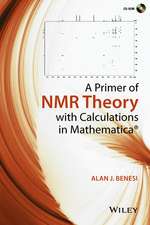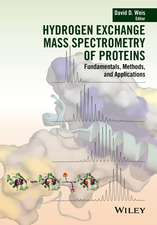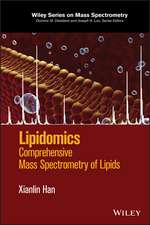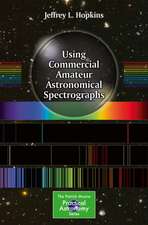Advancing Methods for Biomolecular Crystallography: NATO Science for Peace and Security Series A: Chemistry and Biology
Editat de Randy Read, Alexandre G. Urzhumtsev, Vladimir Y. Luninen Limba Engleză Hardback – 16 apr 2013
| Toate formatele și edițiile | Preț | Express |
|---|---|---|
| Paperback (1) | 1220.57 lei 6-8 săpt. | |
| SPRINGER NETHERLANDS – 16 apr 2013 | 1220.57 lei 6-8 săpt. | |
| Hardback (1) | 1226.73 lei 6-8 săpt. | |
| SPRINGER NETHERLANDS – 16 apr 2013 | 1226.73 lei 6-8 săpt. |
Din seria NATO Science for Peace and Security Series A: Chemistry and Biology
- 18%
 Preț: 963.29 lei
Preț: 963.29 lei - 18%
 Preț: 1386.17 lei
Preț: 1386.17 lei - 18%
 Preț: 956.33 lei
Preț: 956.33 lei - 24%
 Preț: 789.19 lei
Preț: 789.19 lei - 15%
 Preț: 640.55 lei
Preț: 640.55 lei - 18%
 Preț: 1229.10 lei
Preț: 1229.10 lei - 15%
 Preț: 637.46 lei
Preț: 637.46 lei - 15%
 Preț: 645.28 lei
Preț: 645.28 lei - 15%
 Preț: 652.64 lei
Preț: 652.64 lei - 18%
 Preț: 949.90 lei
Preț: 949.90 lei - 5%
 Preț: 993.41 lei
Preț: 993.41 lei - 5%
 Preț: 1417.38 lei
Preț: 1417.38 lei - 18%
 Preț: 1220.45 lei
Preț: 1220.45 lei - 18%
 Preț: 944.82 lei
Preț: 944.82 lei - 18%
 Preț: 945.30 lei
Preț: 945.30 lei - 15%
 Preț: 634.00 lei
Preț: 634.00 lei - 18%
 Preț: 941.05 lei
Preț: 941.05 lei - 24%
 Preț: 789.19 lei
Preț: 789.19 lei - 18%
 Preț: 1224.36 lei
Preț: 1224.36 lei - 18%
 Preț: 1220.45 lei
Preț: 1220.45 lei - 18%
 Preț: 1222.01 lei
Preț: 1222.01 lei - 15%
 Preț: 653.65 lei
Preț: 653.65 lei - 18%
 Preț: 942.63 lei
Preț: 942.63 lei - 18%
 Preț: 941.68 lei
Preț: 941.68 lei - 15%
 Preț: 640.06 lei
Preț: 640.06 lei - 18%
 Preț: 1230.35 lei
Preț: 1230.35 lei - 5%
 Preț: 1419.76 lei
Preț: 1419.76 lei - 18%
 Preț: 1223.74 lei
Preț: 1223.74 lei - 5%
 Preț: 1094.60 lei
Preț: 1094.60 lei - 18%
 Preț: 1230.03 lei
Preț: 1230.03 lei
Preț: 1226.73 lei
Preț vechi: 1496.01 lei
-18% Nou
Puncte Express: 1840
Preț estimativ în valută:
234.73€ • 245.08$ • 194.27£
234.73€ • 245.08$ • 194.27£
Carte tipărită la comandă
Livrare economică 04-18 aprilie
Preluare comenzi: 021 569.72.76
Specificații
ISBN-13: 9789400762312
ISBN-10: 9400762313
Pagini: 376
Ilustrații: XIII, 362 p. 131 illus.
Dimensiuni: 155 x 235 x 26 mm
Greutate: 0.7 kg
Ediția:2013
Editura: SPRINGER NETHERLANDS
Colecția Springer
Seria NATO Science for Peace and Security Series A: Chemistry and Biology
Locul publicării:Dordrecht, Netherlands
ISBN-10: 9400762313
Pagini: 376
Ilustrații: XIII, 362 p. 131 illus.
Dimensiuni: 155 x 235 x 26 mm
Greutate: 0.7 kg
Ediția:2013
Editura: SPRINGER NETHERLANDS
Colecția Springer
Seria NATO Science for Peace and Security Series A: Chemistry and Biology
Locul publicării:Dordrecht, Netherlands
Public țintă
GraduateCuprins
Part I Solution Chemistry.- Simple Alkoxide Based Precursor Systems.- Carboxylate Based Precursor Systems.- Mixed Metallo-Organic Precursor Systems.- Single Source Precursor Approach -Hydrolysis Mechanisms in Organic Media.- Aqueous Precursor Systems.- Polymer-Assisted Deposition (PAD).- Part II Analytical Methods.- Thermal Analysis.- X-ray Absorption Spectroscopy.- Infrared Spectroscopy.- Part III Deposition Techniques.- Dip Coating.- Spin Coating: Art and Science.- Aerosol Deposition.- Inkjet Printing and Other Direct Writing Methods.- Chemical Bath Deposition.- Part IV Processing and Crystallization.- Thermodynamics and Heating Processes.- Epitaxial Films.- Orientation and Microstructure Design.- Low-Temperature Processing .- Composite Film Processing.- UV and E-Beam Direct Patterning of Photosensitive CSD Films.- Template Controlled Growth.- Part V Functions and Applications.- Thin Film Multilayer Capacitors.- Base Metal Bottom Electrodes.- Polar Oxide Thin Films for MEMS Applications.- Conducting oxide thin films.- Transparent Conducting Oxides.- Superconducting Films.- Antireflective Coatings and Optical Filters.- Luminescent Thin Films: Fundamental Aspects and Practical Applications.- Appendix – Syntheses.
Textul de pe ultima copertă
This work presents a snapshot of the state of the art of modern biomolecular crystallography, from crystallisation through structure determination and even interactive presentation on the web. Methods driving the latest automated structure determination pipelines are explained, as well as how to deal with problems such as crystal pathologies that still demand expert analysis. These methods are illustrated through their application to problems of great biological interest, such as the molecular machinery underlying the complement pathway, the mechanism of action of monoamine oxidase inhibitors, and the structure of the eukaryotic ribosome. Complementary approaches, such as neutron diffraction, small angle X-ray scattering, coherent diffraction and computational modelling, are also explored.
Caracteristici
Contributions from acknowledged leaders in the Field Presents methods currently at the forefront, and new emerging approaches






